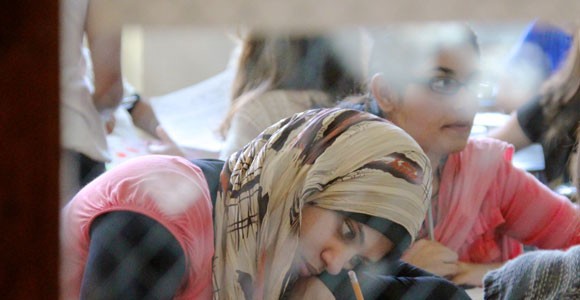Gitte Peng is an education reform expert who served as Senior Education Policy Advisor in Mayor Bloomberg’s administration, developing and overseeing the City’s school reform policies and initiatives. She has also worked at the NYC Board of Education and the National Urban League and in various advocacy and public interest roles. While at Yale Law School, she represented asylum-seekers and low-income clients. Gitte has also produced documentaries for New York Public Television and directed a short about new immigrant teens in the Bronx. [Press materials]
I Learn America, which was co-directed by Jean-Michel Dissard, will play at DOC NYC on November 17 and 20.
WaH: Please give us your description of the film playing.
Gitte Peng: I Learn America follows five new Americans at the International High School over a personally tumultuous year as they come of age in a new land. The International High School, in Brooklyn, New York, is one of 18 public schools dedicated to recently arrived immigrants from all over the world. These five teenagers strive to master English, adapt to families they haven’t seen in years, confront the universal trials of adolescence, and create a future of their own. Amidst the timeless customs of American high school — dating, cliques, sports, prom, graduation — and through their eyes, we rediscover our country and our world as the children of immigration “learn America.”
The film provides an intimate view into the exuberance, humor, and angst of adolescence while showing us what’s at stake in the debate surrounding immigration and education.
WaH: What drew you to this story?
GP: I’d worked in Mayor Bloomberg’s administration for a number of years to reform the NYC public schools. So many of our city’s children are immigrants or born to immigrant parents, and many are English-language learners, and the question of how to meet their needs was, and is, paramount. The Internationals Network model, with small public high schools serving newly arrived immigrants in a rigorous and heterogeneous learning environment, seemed to offer a promising approach to educating immigrant children.
The internationals high schools are extraordinarily diverse, and in that sense they are each a microcosm of the world we live in — but also uniquely supportive and nurturing communities where the kids are able to figure out how to express and assert themselves as they face all the trials of coming of age in a new country. It is mind-blowing that they manage to do this, particularly as society erects countless barriers to their success. They’ve experienced enough in their young lives to give them deep wisdom, perspective, and fortitude. But at the same time, they’re just kids like any other kids in the world, going through the same kinds of adolescent angst and exuberance.
After leaving the Mayor’s Office, I decided to make a short about kids at one of the schools, which grew into a desire to follow students over a year. After working in various capacities in public interest work, and at the 20,000-foot level of education policy and reform, visiting many schools and meeting with hundreds of students and educators, making I Learn America was a welcome chance to get to know people in depth rather than in one-off meetings. And these students are simply awe-inspiring — it’s been an honor to have been welcomed into their lives. While I’d worked for years to effect broad change, making this film allowed me to contribute to the social justice conversation in a more intimate way.
WaH: What was the biggest challenge in making the film?
GP: One of our biggest challenges, though a welcome one, has been developing a public engagement campaign simultaneous with the making of the film. We started from the outset to reach out to various stakeholders in immigration and education — individuals and organizations — to get their feedback, to understand how a very character-driven and not didactic film could help serve their missions, and to partner with them. Building all of these relationships has been just as consuming as making the film itself, but also very rewarding. With the support of our growing coalition of allies, we’re now ready to launch the project. We’ve got great partners on board. Stay with us as we work to spread I Learn America throughout communities and schools across the country and use the film to support immigrant youth.
WaH: What advice do you have for other female directors?
GP: I’m not sure I’d direct any advice specifically towards women, but I’d say that directing a documentary requires a lot of audacity and vision, and the willingness to engage other people in that vision. While much of the work involved is completely joyful to me, much of it is about pitching, selling, and imposing on people, which aren’t generally my favorite activities, even if I believe deeply in the value of the stories I’m telling. Maybe other women will relate. But I’ve learned it’s necessary to get comfortable doing those things if other people are going to believe in the film too. And in fact the process of articulating over and over why people need to get involved in or behind the project is a great way to give focus to your vision.
WaH: Do you have any thoughts on what are the biggest challenges and/or opportunities for the future with the changing distribution mechanisms for films?
GP: Financing is of course one of the biggest ongoing challenges for filmmakers, but is perhaps especially so in the documentary world where the expectation of profit is minuscule and so much must be invested upfront before anyone will consider funding a project. Alternative distribution methods and the world of social media present lots of opportunities, but taking advantage of those opportunities requires a great deal of savvy and a different approach to the work.
Watch the trailer for I Learn America:







